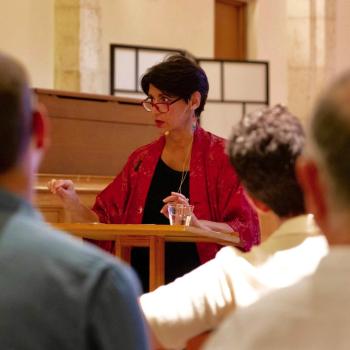 The period in my life where I dealt with my shadow issues was an interesting time.
The period in my life where I dealt with my shadow issues was an interesting time.
I had previously walked away from a denomination that I had been associated with most of my life. I am grateful for many of the lessons it taught me. I can honestly say that I was loved and cared for many of the years I spent there. I have a deep appreciation for many aspects of the faith. And, even though I was wounded and experienced things that I now want to work through, there are many things to celebrate about where I came from. It is sort of like how I feel about my family.
Adopting new spiritual practices can move us in directions that are positive. Sometimes they help us understand things better. Often our new practices can bring an excitement that has been missing. But, most often if they are legitimate, they open us up and expose areas that we have been avoiding. The phrases and practices that originally caused us to avoid these areas is what many term, spiritual bypassing.
Ever since man invented religion to help him understand God, he has spent a lot of time trying to transcend this earth and avoid the physical realities of life. To me, spiritual bypassing is:
using spiritual language or making religious excuses for not doing the hard and difficult work of navigating this world that we live in.
We are spiritual beings, but we also must face the hard realities of our woundedness and struggles as humans. Bypassing is when we exchange something that takes effort and replace it with something easy that sounds good.
My religious background taught me many catch phrases and quoted various Scriptures regularly to help me avoid having to face things that were difficult or to deal with something I didn’t understand. So, the best way I can think to describe this process is to share some of these phrases with you.
Thoughts and Prayers
My prayer life has certainly evolved in the past few years. My prayer is much more contemplative and slower and quieter. It is way less about asking God for things and much more about becoming and being for me. Prayer to me is a connection to the Divine and to those that I am thinking about when I pray. Recently I noticed that a lot of times when we say, “I’ll pray for you,” it is really a form of bypassing. Usually what people often need is empathy which sounds more like “that sucks” or “me too” instead of promising to represent them before God. Is that what we really mean when we say, “I’ll pray?”
I think what would be more helpful and healing would be to empathize with the person. Or, maybe we could just sit with them and cry or hold their hand. During a time I call, my shadow experience, not once did I ask people to “pray for me” or “surround me in prayer” or “go before the throne.” I think most of that kind of thing is just spiritual bypassing. I tend to think God was already there in the room with me and, that day, I could literally feel the presence. There wasn’t any need to get a bunch of people to beg him to be there – he was already there – where else would He be? There was no one to impress with spiritual words. It was time to get to work.
God is in Control
I used to tell people “God is in control.” It felt very spiritual to say that. My boss even got through a tough time because I told him that. But the reason he got through the tough time was because he also told all his employees to buckle down. And they all believed they could get through it or that they didn’t have any other options, so they emerged on the right side of the situation—the company survived. God probably cares much more about character and how they treated each other than whether they won with that financial victory. Luckily, they did not really believe God is in control or they would not have done the work necessary to save the company.
I do not think God controls us because control is a result of fear and I don’t think the Divine would be afraid. In my book, Apparent Faith, I discussed this topic. I don’t think control does anything noble because there are many things more important than things turning out like we want. The biggest reason I no longer say, “God is in Control,” is because when I say it, I tend to shuck off all my responsibility for whatever I am hoping God will control. Please consider the following statement:
My unmet needs and my deepest wounds are never going to be addressed until someone stops assuming God will fix them and gets down to the hard work of healing!
God has a Purpose
Another way to totally abdicate all responsibility is to say, “God has a purpose.” Religious fix-it people often add, “It will all work out for good in the end,” or the worst ever, “are you sure there’s not some sin in your life?” None of these people in our lives are trying to hurt us, but none of those phrases ultimately help us or make the situation any better. They simply bypass the issue and make all of us feel a little temporary, superficial comfort that doesn’t last.
Almost everyone I know avoids the hard work of getting better, either out of ignorance or stubbornness or pride. I understand why they do it because I know why I did it. This is all we know to do. But I really don’t need a religious platitude to bypass my problem. I need somewhat of a plan, and I need encouragement to do the hard work necessary.
I think most of the flaws in most religious systems are the beliefs that there are magic solutions to problems. I recognize there are miraculous things about life that are hard to explain. Just the fact that our body can seek out and destroy a virus most of the time is amazing. Every cell of our bodies is unbelievably magical. But it is important to get out of this dependency to bypass the normal physical processes of life for an easy magical answer based loosely on truth and often out of context.
People that understand the brain better than me call it dissociating. It means to “to disconnect or separate.” Spiritual bypassing separates us from our humanity and all its messiness and struggles and pain and makes us feel good briefly.
Being Happy
I noticed many of my faith communities seemed stubbornly determined to be happy. But sometimes the human condition calls for something different than happiness. Bypassing tries to convince us that we should avoid anything painful and just pray that God would take it away magically. I like when my contemplative friends talk about “sitting” with the things that trouble them. This at the least is a good start. The next step after that is most likely compassion.
Several times in my life, I have addressed serious issues important to my recovery. At those times, I didn’t recite any famous prayers. I didn’t read any Scripture. I didn’t sing any religious songs. I didn’t rub any beads or say any mantras. All those things have their place, but what I did in these moments of discovery was something different. I’m not saying it’s for everyone, but what I said was, “Okay I’m all in!” And that’s where the healing began.
Bypassing only derails that process.
Support us on Patreon * The Desert Sanctuary Website
Karl Forehand is a former pastor, podcaster, and award-winning author. His books include Apparent Faith: What Fatherhood Taught Me About the Father’s Heart and the soon-to-be released Tea Shop. He is the creator of The Desert Sanctuary and Too Many Podcasters podcasts. He is married to his wife Laura of 32 years and has one dog named Winston. His three children are grown and are beginning to multiply!














